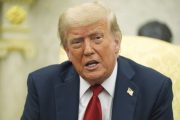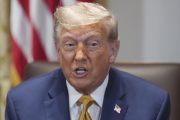On September 4, officials of the Yemeni government sent local tribal authorities to look into reports that civilians were among the casualties of a drone attack believed to have been carried out by the United States on September 2. Yemenis protested in response to the 13 civilians, including three women and one child, killed in the Hellfire missile strike. Adding to the outrage was the Yemeni government’s statement that the intended target, Abdelrauf al-Dahab, was “completely missed.”
CNN reports that grieving members of the families of the dead attempted to deliver the bodies to the home of Yemeni President Abdu Rabu Hadi, but were kept out by guards. Notwithstanding the heartache, on September 5 a second drone fired eight missiles, destroying a house in Yemen’s eastern province of Hadramout where five suspected “militants” were believed to be meeting. Again, a Yemeni government spokesman attributed the attack to the United States.
Curiously, the strike came only a day after Obama administration “war czar” John Brennan discussed the increase in militant activity in a phone conversation with President Hadi, according to reports from Saba Net, Yemen’s official news agency. Saba reports, “Mr. Brennan stressed that the USA would support Yemen to carry out the Gulf initiative till the end of the transitional stage and achieve the desired goals.”
Reuters quotes a Yemeni government official’s statement that “five militants were dead and three were injured and managed to escape” in the September 5 attack. Other stories put the number killed at six.
An account in Long War Journal records that “no senior AQAP [al-Qaeda in the Arab Peninsula] have been reported killed in the attack.
An anonymous Yemeni security official confirmed that account, telling CNN that only one of those killed in the attack had more than a few years in the organization. He added, “None of those killed [was] on the government’s list of most-wanted terrorists.”
Twenty-nine people have been killed by drone strikes the week of September 2 in Yemen, including the numbers killed in the September 2 and September 5 strikes. That raises the 2012 total of dead-by-drone in Yemen to almost 200.
Congress has not declared war on Yemen, but that has not dissuaded the White House from consistently ramping up the number of drone strikes in that nation. A story published at Wired.com reports that “the U.S. has two separate drone campaigns underway in Yemen — one run by the CIA, the other by the military’s Joint Special Operations Command.” Long War Journal reports that between the two operations, the United States has carried out 43 drone strikes since the beginning of 2011, resulting in the deaths of 274 people.
As for how many of those were legitimate threats to the security of the United States, it is difficult to say. The White House doesn’t bother with such distinctions, anyway. As The New American has reported, President Obama has signed off on the use of “signature strikes” in Yemen. Basically, the spymasters calling the shots don’t have to identify a particular person suspected of committing a particular crime; they only have to receive reports of “suspicious behavior” before firing the deadly missiles at the target.
A “high-ranking Yemeni intelligence official” quoted in the Wall Street Journal criticized this policy: “Every Yemeni is armed, so how can they differentiate between suspected militants and armed Yemenis?”
The easy answer is that they don’t bother differentiating.
Although the Obama administration has kept a tight lid on the details of its “death by drone” program, earlier this year the White House’s top counterterrorism advisor, John Brennan, admitted for the first time publicly to the extent of the use of drones in America’s War on Terror. Brennan said that the remote control killing of suspects on foreign soil who have been charged with no crime whatsoever, is “in full accordance with the law.”
Brennan also said the United States “respects national sovereignty and international law.”
Later, during a conversation with Margaret Sanger at the Council on Foreign Relations (CFR), Brennan defended President Obama’s remote-control killing of suspected militants. “So long as AQAP seeks to implement its murderous agenda, we will be a close partner with Yemen in meeting this common threat,” he said.
In his interview with the CFR, Brennan said the president deploys drones only to target “militants” with designs on attacking the United States or its allies abroad. He admitted that American intelligence agents provide tactical support to Yemeni armed forces battling al-Qaeda on the ground.
When asked about the collateral deaths of innocent civilians during these attacks, Brennan responded that American drone pilots “make every effort” to avoid killing innocents. Said Brennan:
Today I’d simply say that all our CT [counterterrorism] efforts in Yemen are conducted in concert with the Yemeni government. When direct action is taken, every effort is made to avoid any civilian casualty. And contrary to conventional wisdom, we see little evidence that these actions are generating widespread anti-American sentiment or recruits for AQAP. In fact, we see the opposite, our Yemeni partners are more eager to work with us. Yemenese citizens who have been freed from the hellish grip of AQAP are more eager, not less, to work with the Yemeni government. In short, targeted strikes against the most senior and most dangerous AQAP terrorists are not the problem, they are part of the solution.
Describing the disregard for innocent human life as part of a “solution” is eerily reminiscent of similar statements made by despicable tyrants in the recent past.
Furthermore, Princeton professor and author Gregory Johnsen warns that “The U.S. strategy runs the risk of driving more people into the arms of Al Qaeda.”
“In an effort to destroy the threat coming out of Yemen, the U.S. is getting sucked further into the quicksand of a conflict it doesn’t understand and one in which its very presence tilts the tables against the U.S.,” he writes.
Johnsen predicted the disintegration of Yemen over two years ago in an article published in Foreign Policy. He wrote,
Washington’s continued insistence on seeing the country only through the prism of counterterrorism has induced exactly the results it is hoping to avoid. By focusing on al Qaeda to the exclusion of nearly every other threat and by linking most of its aid to this single issue, the United States has only ensured that al Qaeda will always exist.
Of course, the United States could avoid the Yemeni quicksand — as well as similar quagmires waiting in Iran, Syria, and elsewhere — by adhering to the Constitution. First, Congress is given exclusive power to declare war. They have not done so. Next, the principle of due process is one of the bedrock concepts upon which our supreme law is based. To callously explain away and accept the deaths of innocents in an undeclared “war” is contrary to to our Constitution and our reverence for life.




